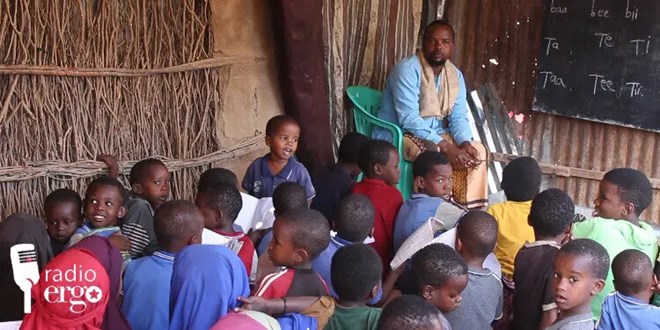
Friday November 1, 2024

Children attend an overcrowded makeshift classroom in Mogadishu's displacement camp, highlighting the urgent educational crisis faced by displaced families in the region. Credit: Radio Ergo.
Mogadishu (HOL) — Mogadishu's displacement camps are facing an escalating educational crisis, with 6,000 children from impoverished and displaced families in Kahda, Dayniile, and Garasbaaley districts unable to access schooling. A survey conducted by the BAR teachers' association has laid bare the extent of the problem, identifying economic hardship and the lack of free schools as primary barriers.
Farhiyo Mohamed Ali, a mother of eight school-age children, expressed her distress. "We cannot afford it. We live day by day. Now, we need the Somali community to help us find a way for our children to receive free education," she said. Farhiyo, who single-handedly raises her children, earns just $3 to $5 a day digging waste disposal pits—barely enough for basic sustenance.
In the Bil-iyo-hidig displacement camp in Kahda, 590 families share a similar plight, facing a future with no educational prospects for their children. Aadan Abdi Mohamed, a father of six, has spent over a year seeking a free school for his children, but he cannot cover private tuition fees. "Our children just stay in makeshift shelters, which is a struggle. Children without education become an additional burden, and we, as parents, have nothing," Aadan explained.He works sporadically unloading food supplies from trucks, earning up to $5 on good days. Displaced from Iji in Middle Shabelle due to recurring clan conflicts, Aadan's family once lived a stable life supported by farming. Now, they face a harsh new reality where even primary schooling is beyond reach.
The impact of this crisis is personal for 11-year-old Omar Ali Said, who hasn't attended classes since July. Once studying for free at Baraarug school in Garasbaaley, Omar's education came to a halt when the school closed due to funding shortages. "I cannot afford to pay for school anymore, so I decided to stay home," said Omar, who had been preparing for third grade. His mother, who earns just $3 to $5 washing clothes on sporadic days, struggles to provide for her seven children.
Abukar Macalin Yusuf, Secretary-General of BAR, explained that their survey found 17 schools serving 11 camps in Dayniile, Kahda, and Garasbaaley had closed over the past year. "Previously, there were schools funded by organizations, but 93% have now closed. The closure has left children idle, with some turning to drug use or joining gangs," Abukar noted.
The educational crisis extends beyond Mogadishu to other regions, where free schools remain scarce and families unable to afford private schooling continue to grow in number. The findings from BAR's survey illustrate an urgent need for solutions to bridge the educational gap and protect Somalia's most vulnerable children from a bleak future.